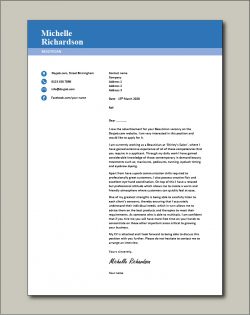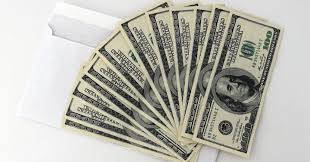The Cover Letter and Why You Won’t Get the Job without It
It’s a known fact that a resume is vital in your job search. However, it’s not the only important document you need to secure an interview for the job you want. While you might think your resume will provide employers with all the information they need, the resume is of less importance to a prospective employer if it’s not accompanied by a great cover letter. Cover letters are of high value to employers because they provide context for your application or resume. A cover letter is a letter of introduction that points out your key accomplishments, strengths and qualifications for a particular job. It’s a chance to target the job opening and the employer in a very precise way. It also allows the employer to distinguish between two job candidates with similar qualifications and experience. An impressively written cover letter is one key to standing out above your competition.
I this article we are going to cover all the bases on the what's, why's, and how's of writing a cover letter.
What Is A Cover Letter?
A cover letter is a letter of introduction that points out your key accomplishments, strengths and qualifications for a particular job. It’s a chance to target the job opening and the employer in a very precise way. It also allows the employer to distinguish between two job candidates with similar qualifications and experience. An impressively written cover letter is one key to standing out above your competition.
Why Write a Cover Letter?
You shouldn't send your resume without a cover letter. It’s important to tailor each cover letter to the specific job opening. While you don’t have to write it from scratch every time, it’s vital to adjust the content to perfectly highlight what makes you the best candidate for the position.
They tell the employer what kind of job you are looking for, and how you are qualified for it.
You should keep in mind that most employers read the cover letter first. In fact, they’ll not even look at your resume until they’re satisfied with the content of your cover letter. For this reason, you should do research on the employer and the job before jotting down a cover letter. Remember to write in an engaging style and in a way that’s applicable to the job.
What is the Point of a Cover Letter?
The cover letter should introduce you to the employer, show your interest in the vacancy, provide attention to your resume and encourage the employer to interview you. It's basically the initial contact you have have with the employer. As such, a neatly, concisely, and well-written cover letter should attract the employer to take a look at your application with more interest and will certainly increase your chances of securing an interview.
In essence, the cover letter shouldn’t repeat your resume in a shorter form. Instead, it should tell the employer what it is about the job opening that attracts you, why you want to work for the employer and why you think you’re the best candidate for the vacancy. You should also include the unique skills and qualities that you’ll bring to the job and to the organization.
It’s also important to remember that your cover letter can dent your chances if it’s carelessly written and full of typos and errors. The employer will take a glance and discard it in the trash bin if it doesn’t contain the information he/she is looking for.
How to Write a Cover Letter
Writing an amazing cover letter is certainly not an easy task. It requires you to be thoughtful, knowledgeable and understand what needs to go in there. Typically, a cover letter consists of three parts: introduction, body, and conclusion. These three parts must include the following:
- Introduce yourself
- Mention the job you’re applying for (why you’re interested in the organization)
- Show how your skills and qualities match the job in hand (why they should be interested in you)
- Encourage them to read your resume
- Conclude with a call to action (politely ask for a meeting or interview with the employer).
Let’s look at the three main parts.
Introduction
The introduction part of your cover letter should captivate the employer’s interest. You should identify the position you’re applying for, where you heard about the job and your career objectives. You should also describe why you’re interested in that particular job.
Body
This should roughly be one to three paragraphs. You should show that you have a deep understanding of the position and what it entails. You should do this by precisely explaining how your skills, qualifications, and experience suit the position. Briefly highlight how the skills and qualifications in your resume make you the best candidate for the position.
You should avoid the mere repetition of what’s already in your resume. Instead, use this section to demonstrate in a very specific way how you believe your experience and skills can contribute to the organization.
Conclusion
Your main objective is to obviously to secure an interview and so you want to trigger an action that can motivate them to invite you. In your conclusion, you should kindly suggest what action you plan to initiate to maintain contact or what you’d like the employer to do. This can include a formal request for an interview and/or your intent to follow up in the near future in writing or with a phone call. Remember to be respectful and never forget to sign it!
How Long Should a Cover Letter Be?
A cover letter should be short. It’s supposed to be a summary of your resume so you shouldn’t write more than one page.
What Kind of Information Should You Include in a Cover Letter?
In addition to the above-mentioned things, you should include the following in your cover letter:
Your Name and Contact Details
You should put your name and contact details at the top of your cover letter. While you necessarily do not have to give your postal address, it’s crucial to include your phone number and email address. Remember to use an email address that looks professional. Avoid using something like motoyombolepadrechickenpox@ymail.com. Just use a simple email address that includes either your first or last name.
Find out whom to address it to
It’s important to find the name of the person who will read your application. This can take a little effort, but it’s certainly worth it. This is because it’s not advisable to address your cover letter To whom it may concern’.
After your name and contact details, include the following:
- The name of the person you’re writing the letter to
- The name of their company and position
- Their contact details.
Feel free to contact the company and find out who you should address your application to. You can only use To whom it may concern’ if all the avenues are not available.
Things to Avoid in Your Cover Letter
There are a few things that shouldn’t be anywhere near your cover letter. They include:
Typos or Mistakes
You already know that typos are a no-go zone as far as formal writing is concerned. Ensure that you always spellcheck your cover letter at least three times and make sure that it’s devoid of any typos or mistakes. In fact, you should have someone else read it so that he/she can point out any mistakes. In short, double check everything in your cover letter.
Avoid Using “I” too much
It’s important that you avoid using “I” too much. Avoid using phrases like; I am’, I have’, and I believe’. It shouldn't be about you. It’s about how you can help the organization. A rule of thumb is not to use I’ more than twice in each paragraph.
Avoid Using Sexist Language
It’s inappropriate to use Dear Sir’ or Dear Madam’ if you’re answering a blind advert with no specific name(s). It’s advisable to get a specific name of the person to address the letter to. If this however proves impossible, you can uses phrases like “Dear Hiring
Official” or “Dear Director of Human Resources”.
How to Make Yourself Stand Out
Although you should go about it in a professional way, your cover letter should differentiate you from the crowd and make you stand out. Make yourself unique by the way you write and deliver your credentials. That being said, you can do the following:
Use Attention-grabbing Action Verbs and Adjectives
Describe yourself and convey your credentials using action verbs and adjectives that bring interest and add flavor.
Vary You Writing
You should make your cover letter interesting and easier to read. Use transitional words and phrases that make your ideas flow together quite easily. Avoid using long sentences and instead, go for short and clear sentences.
Following Up
Following up on your application is very crucial and your success in securing an interview or even getting hired will largely depend on how well you do this. Do not just drop an application and forget about it! Remember, employers are busy and do not have adequate time to respond to every letter they receive. You should therefore consider calling the employers to follow up on your application.
The best time to do this is between Tuesday and Thursday. You can call them in the morning (8:30-9:00) or in the evening (4:30-5:00). If you reach an answering machine, politely leave your message, name, and mention that you’re following up on correspondence. You can also mention that you’d like a return call, which should include when and how you can be reached. Do not give up hope even if you do not hear from them within a week. Try again and remember that your persistent and determination will pay off!




